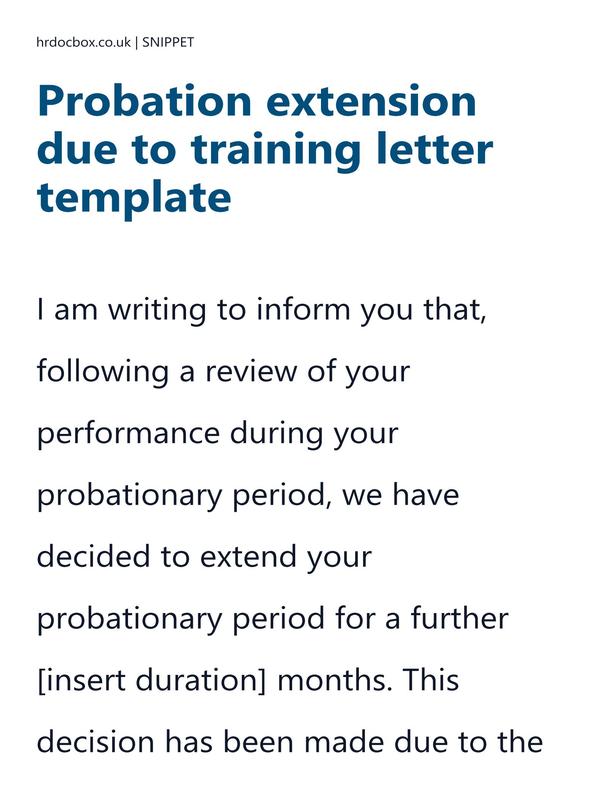Probation extension due to training letter template


Our Probation Extension Due to Training Letter Template offers additional time and support, ensuring employees can improve and meet performance expectations.
- Includes Probation extension due to training letter template, plus 12 months’ access with all updates provided free of charge and notified to you.
- UK-specific accuracy.
- 236 words over 1 page.
- Last updated 10/03/2023.
- Format: Word / plain text / email.
- Delivery: Instant download after purchase (no physical item).
- Access: Download link shown here after checkout.
- This Probation extension due to training letter template will SAVE you up to 1 hour drafting & research. Save cost. Reduce risk.
[Sender name]
[Sender address]
[date]
[Recipient name]
[Recipient address]
Dear [Recipient first name],
Probation extension
I am writing to inform you that, following a review of your performance during your probationary period, we have decided to extend your probationary period for a further [insert duration] months. This decision has been made due to the need for additional training to help you meet the requirements of the role.
We have identified areas where you would benefit from additional training, and we believe that with the right support,
This is a 30% preview of the Probation extension due to training letter template. For instant full access, purchase this item or a parent bundle.
Probation extension due to training letter template purpose
The purpose of a "Probation Extension Due to Training Letter Template" is to formally communicate to an employee that their probationary period is being extended due to the need for further training.
The letter serves as a means to provide the employee with clarity about the extension and the reasons for it. It outlines the specific training and support that will be provided to help the employee improve their skills and performance. The template aims to give the employee an opportunity to address any performance concerns during the probationary period, demonstrating the employer's commitment to supporting their development.
Additionally, the letter helps document the extension decision and the steps being taken to assist the employee in meeting the required performance standards.
A letter extending a probationary period due to further training required is essential for the following reasons:
- Clarification: It provides clarification to the employee that their probationary period is being extended and the reasons why it is being extended.
- Expectations: It sets clear expectations for the employee in terms of the additional training that is required and the specific targets and objectives they need to meet during the extension period.
- Support: It provides reassurance to the employee that they will be receiving the necessary support and guidance to help them improve their performance and meet the requirements of the role.
- Record-keeping: It also serves as a formal document that can be kept on file for record-keeping purposes, providing evidence of the decision to extend the probationary period and the reasons why it was necessary.
Practical application of a Probation extension due to training letter template
- The Probation extension due to training letter template should be actioned / delivered as soon as possible after a decision is made.
- It is sent / delivered by an employer / HR team to an employee.
Compliance
Compliance
This Probation extension due to training letter template incorporates relevant UK laws and HR standards, including those listed below:
In the UK, completing a probationary period does not have any legal effect in and of itself. The probationary period is a contractual agreement between the employer and employee, and its purpose is to allow both parties to assess whether the employee is suitable for the role.
When issuing a Probation extension due to training letter in the UK, there are a few key employment laws that should be considered:
- Employment Contracts: The employment contract should be reviewed to ensure that it allows for the extension of the probationary period and specifies the conditions that must be met for the extension to be granted./li>
- Discrimination Law: Employers must ensure that any decisions made regarding probation extensions are not discriminatory in any way. This means that the decision must not be based on the employee's race, gender, age, disability, religion, sexual orientation, or any other protected characteristic.
- The Equality Act 2010: Employers must not discriminate against employees on the grounds of their age, disability, gender reassignment, marriage and civil partnership, pregnancy and maternity, race, religion or belief, sex, or sexual orientation. Any probation extension due to training should be applied fairly and objectively to all employees.
- Notice Periods: Employers should also consider the notice period required for extending the probationary period. This may be outlined in the employment contract or in the company's policies and procedures.
- Training and Development: Employers must ensure that employees are given adequate training and support to help them meet the requirements of their role. Any decision to extend a probationary period due to training should be made in the context of this requirement.
- Right to Appeal: Employees have the right to appeal any decision to extend their probationary period. Employers should have a process in place for employees to raise any concerns they may have and for these concerns to be addressed.
Probation extension due to training workflow
Probation extension due to training workflow
Check which resources should be implemeted before and/or after the Probation extension due to training letter template, to understand the workflow.
Probation review form
Our Probation Review Form Template streamlines evaluation, ensuring consistent and objective assessments during the probationary period.
Probation review meeting invitation letter
Our Probation Review Meeting Invitation Letter Template schedules structured discussions, ensuring clarity and preparation for employee evaluations.
Frequently Asked Questions about a Probation extension due to training letter template
Frequently Asked Questions about a Probation extension due to training letter template
-
Can I use the Probation extension due to training letter template in my small business?
Yes. The Probation extension due to training letter template is designed to be flexible and suitable for organisations of all sizes, including small businesses and charities. It follows UK employment law best practice, so even if you don't have an in-house HR team, you can confidently apply it.
-
Is the Probation extension due to training letter template compliant with 2026 UK employment law?
Absolutely. Like the Probation extension due to training letter template, all of our templates are drafted with the latest ACAS guidance and UK employment legislation in mind. We review and update them regularly, so you can be confident they remain compliant.
-
Can I customise the Probation extension due to training letter template for my organisation?
Yes, we highlight the areas of the Probation extension due to training letter template that you need to update with your own details, and where you need to make decisions to suit your situation. This saves you time and ensures that you meet best practice.
-
Do I get instant access to the Probation extension due to training letter template?
Yes. Once purchased, you'll be able to download the Probation extension due to training letter template instantly. Templates are provided in editable Word or Excel format so you can customise them easily, and in PDF format for easy sharing.
-
What if I need more help, not just a Probation extension due to training letter template?
If you're looking for broader support, we also offer toolkits and library bundles that include the Probation extension due to training letter template, along with other HR templates and policies for fully managing your situation. These may be more cost-effective if you need deeper advice.
-
Why should I use this Probation extension due to training letter template, and not AI to generate it?
The risk of using a free AI-generated template 'without review' includes your legal exposure, missing context, and no awareness of the wider process, whereas purchasing the Probation extension due to training letter template from us mitigates that risk.
